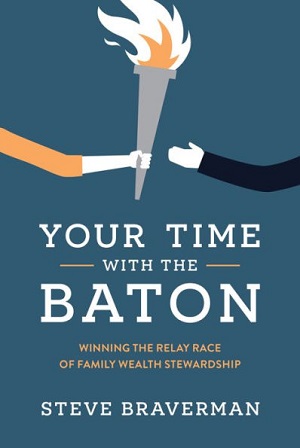“Wealth should be defined by more than just the numbers,” Steve Braverman writes in his new book, entitled Your Time with the Baton: Winning the Relay Race of Family Wealth Stewardship. “…It’s good that the industry has moved into having wealthy people impart information to their heirs to teach them, but, as I’ve said, that approach is one directional.
RELATED URL: https://yourbatontime.com/
Everyone involved in a wealth transfer needs to think about what the wealth means, what the family values are, why they want to pass the money on, and what those who receive it want to do with it. We need an ongoing dialogue among all of these people. Ultimately, all of these people will function best as part of a team, working together, listening to each other, learning from each other, and thereby making their team more successful and the individuals on the team more fulfilled—and, one hopes, also contributing to society in creative and lasting ways.”
He also writes, “…Creating new opportunities is what this book is about. Do the people with this family wealth want to build a business empire? Create more equitable workplace environments? Establish a charitable foundation? Figure out how to lessen environmental impact? What I’m talking about is multigenerational impact. One of the big things that is going to come out of perpetuating this team approach, this approach that involves partnership and collaboration, is wealth that will be measured not only by the perpetuation of the financial assets but by the continuity of a legacy, by creating fulfilled, satisfied, responsible individuals who care about themselves, their families, and their society.
Philanthropy can be part of it, of course. If you’re going to give a large amount of money to a hospital and they’re going to fund a study to cure cancer, that’s wonderful. But the larger idea is to create a culture of wealth within a family that perpetuates personal self-worth, personal responsibility, maturity—in whatever ways different family members want to express those qualities.”
Braverman writes from as much a personal place, as a professionally informed one. He himself admits he is a product of inherited wealth, and like the mindset he advocates for in the book runs a wealth management firm indicative of said qualities. “If your kids, grandkids, great-grandkids, and lineal descendants all find themselves fulfilled in their life’s work, whatever that is, then what better legacy could there be for a multigenerational family of wealth? It doesn’t just mean that each family member has received $X millions of spendable wealth,” Braverman writes. “…When I was building my own business, with the support of my family’s wealth, my kids watched me get on airplanes every week, sometimes missing their sports or drama events or whatever kinds of events they were participating in.
BUY THE BOOK: https://www.barnesandnoble.com/w/your-time-with-the-baton-steve-braverman/1142484097
But they understood—because I told them this as soon as they were old enough to understand it—that it was all about running my leg of the relay race, all about honoring the legacy I’d inherited from my father by striving to be successful… If every generation in a wealthy family addresses the next generation with that kind of affirmation and support, the family will have a legacy of success. And, to me, that is the ultimate expression of successful wealth transfer.”
Cyrus Rhodes



























